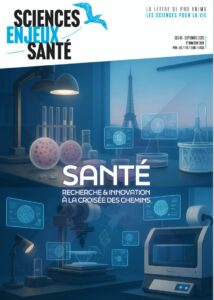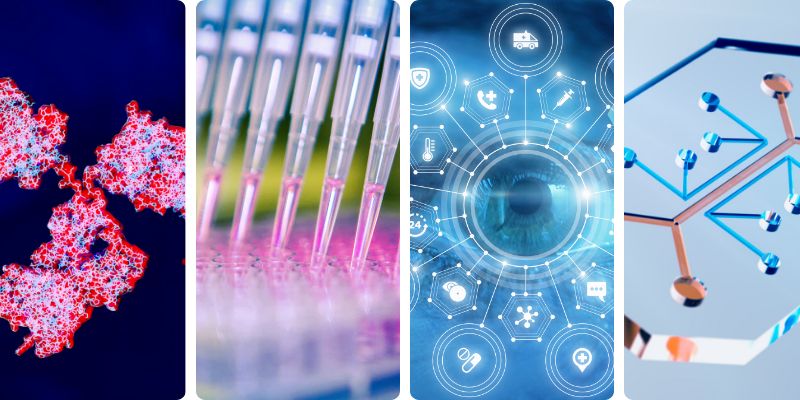
News on non-animal methods
JULY 01 - 05, 2024
NEWS, REPORTS & POSITION STATEMENTS
1. Scientists committed to revolutionize chemical safety testing met in Brussels
Leading scientists from Europe and North America convened in Brussels in June to chart a future for chemical safety testing that prioritizes ethics, accuracy, and efficiency. The mission: to advance scientific test methods that can enhance protection for human health and the environment from toxic substances.
This collaboration represents a pivotal step toward safer, more ethical, and more accurate chemical safety assessments, marking a significant milestone in scientific and regulatory progress. As these innovative methods gain traction, they promise to transform chemical safety testing, protect human health, and preserve the environment while aligning with evolving societal values.
2. Reagan-Udall Foundation report on in silico technologies
Reagan-Udall Foundation, is a non-profit structure created by the US Congress to advance the mission of the FDA. The Regulatory Science Accelerator (RSA) creates collaboration space for academics, researchers, and other experts to share information on emerging technology relevant to FDA. In addition, RSA activities can positively influence the way science is conducted in the focus areas of regulatory science by stakeholders in the FDA-regulated ecosystem.
Guided by the 2022 update to the “Advancing Regulatory Science at the FDA: Focus Areas of Regulatory Science” report, the RSA then convened expert clusters (working groups) focused on In Silico Alternative Methods and Good Simulation Practice. The latest document, ‘In Silico Technologies — A Strategic Imperative for Accelerating Breakthroughs and Market Leadership for FDA-Regulated Products’ is geared towards executives who need to make strategic decisions, including how to get products with the greatest patient benefit to market faster.
3. Spotlight Medical, a new Institut Curie spin-off for personalized cancer treatment
Founded by a doctor, an AI researcher and an entrepreneur, Spotlight Medical is tackling the major problem of inappropriate cancer therapies. Too many patients are offered unspecific treatments, reducing their chances of recovery and quality of life. The founders of Spotlight Medical are deeply convinced that patient data harbors a phenomenal amount of information that can be harnessed by AI to identify the most appropriate treatment for each individual, and thus dramatically improve care.
“Our extremely powerful and innovative technology opens up unprecedented prospects for personalized cancer treatment. The potential impact on patient survival and quality of life is immense, promising a new era in personalized cancer treatment. Our mission is to make this a reality for every patient and their family,” says Sylvain Berlemont, co-founder and CEO of Spotlight Medical.
4. 6 signs AI momentum in drug discovery is building
As pharma giants like Darmstadt, Germany – based Merck KGaA announce new pacts with AI companies, the drug development landscape is witnessing a familiar pattern of emerging tech adoption. AI’s promise of faster, more efficient drug discovery has captured the industry’s imagination, leading Big Pharma to ramp up investment in AI startups and partnerships.
To unravel the current state and future potential of AI in drug discovery, Drug Discovery & Development have reached out to Dave Latshaw II, Ph.D., former AI drug development lead at Johnson & Johnson and current CEO of BioPhy.
5. A model of Collaborative Ethics to guide translational research
Historically, ethicists – who form the branch of philosophy that is concerned with morality and studies of human conduct in relation to the self, others, and the natural world – were only given the opportunity to analyze transformative breakthroughs in the life sciences after-the-fact, when new scientific possibilities already start to impact the real world.
Jeantine Lunshof, who is the Wyss Institute’s Collaborative Ethics lead, together with her intern Julia Rijssenbeek from Wageningen University in the Netherlands, has published the “Collaborative Ethics Model,” which proposes a multi-stage process of close and continued collaboration between scientists and ethicists to ensure that new technologies are safe and beneficial for all.
INTERVIEWS, NOMINATIONS & AWARDS
6. Sinai Health’s $10M funding fuels creation of lab-grown organoids for disease research and drug discovery
Scientists around the world are racing to culture three-dimensional organoids for all kinds of tissues, to mimic human development and disease in a dish that could revolutionize research and drug discovery. Now, thanks to a $10 million investment from the federal and provincial governments to Dr. Wrana, with Dr. Pelletier as co-lead, and their colleagues, Sinai Health will establish a state-of-the-art tissue engineering platform for the development of various organoids, including the brain, gut, lung, and kidney.
“This is an exciting time for tissue engineering and regenerative medicine research,” said Dr. Anne-Claude Gingras, co-Director with Drs. Wrana and Pelletier of the NBCC, Director of the LTRI and Vice President of Research at Sinai Health. “The Tissue Engineering Design Suite will ensure that our researchers and collaborators have access to the latest equipment and expertise to be able to make discoveries that could transform our understanding of disease.”
7. CAAT Humane Education and CAAT Reduction Grants
The Johns Hopkins Center for Alternatives to Animal Testing (CAAT) is now accepting proposals for the 2024 Reduction and Humane Education Grants.
CAAT’s Beyond Classical Refinement Program, led by Kathrin Herrmann, PhD, has been awarding two annual grants for Reduction of animal experiments and for humane education. The Reduction Grant is given to a research project that helps reduce animal use by identifying areas of research and testing where animal models lack reproducibility and translational value. The Humane Education Grant awarded for the development of animal-free training resources for veterinary, medical or laboratory courses.
Each grant includes prize money of $6,000 USD. The deadline for receipt of submissions is September 30, 2024 at 11.59 pm EST.
TOOLS, PLATFORMS, CALLS
8. Join ECHA in bridging the gap between science and regulation
In its Strategy 2024 – 2028, the European Chemicals Agency (ECHA) has set a vision for the next five years, prioritizing protecting the health and the environment. ECHA has identified key regulatory challenges and outlined its research needs under the European Partnership for the Assessment of Risks from Chemicals (PARC). These needs, updated for 2024, include: developing new approach methods, identifying and regulating bioaccumulative substances, and shifting away from animal testing.
Researchers and experts are encouraged to align their work with ECHA’s outlined needs, contributing to a safer and more competitive EU chemical market. If you have ongoing research that aligns with these needs or if you’re interested in collaborating, contact ECHA.
9. ImmuONE awarded across three categories at the Inspiring Herts Awards 2024
ImmuONE, an in vitro lung platform and testing services for assessing the safety of chemicals, was recognised and celebrated at the Inspiring Herts Awards 2024, winning awards across three different categories.
ImmuONE took home the prestigious award for ‘Business of the Year – North Herts’, which was awarded to us for consistent growth, robust financial performance, and unwavering commitment to staff and innovation. From the pool of winners, there was also a special recognition category which honoured ImmuONE with the ‘Inspiring Business of the Year’ award for making the biggest innovation in Hertfordshire. In addition to the company’s awards, Dr Abigail Martin was honoured with the ‘Entrepreneur of the Year’ award.
Listen the BBC podcast on 3D lung
SCIENTIFIC DISCOVERIES & PROTOCOLS
10. Novel organoid culture system for improved safety assessment of nanomaterials
The Korea Research Institute of Standards and Science (KRISS) has developed the world’s first organoid culture method capable of accurately assessing human toxicity of nanomaterials. Overcoming the limitations of the conventional culture method, this new technology is expected to bring forward the commercialization of organoid-based safety assessment of nanomaterials and nanomedicine.
Tae Geol Lee, the head of the Nanosafety Metrology Center at KRISS, said, “As the need for animal replacement testing, required by the Ministry of Food and Drug Safety and the US FDA, is continuously growing, it is very meaningful that we have developed the world’s first organoid-based nanomaterial safety assessment technology through convergent and cooperative research with a hospital.”
Read the scientific publication
11. Scientists generate kidney organoids with a complex vascular system
A study led by the Institute for Bioengineering of Catalonia (IBEC) describes a new approach to producing mini-kidneys in the laboratory that mimic a complex vasculature, similar in some characteristics to those of the human kidneys. These “asembloids” are created by combining 3D kidney organoids with endothelial organoids.
These findings not only provide valuable insights into the development of renal organoids, but also lay the groundwork for the development of new methods to vascularize these organoids. This could have applications in organoid transplantation in clinical settings and in the study of vascular dysfunction in human disease.
Read the scientific publication
12. Brain Chimeroids reveal individual susceptibility to neurotoxic triggers
In a new study from MIT and Harvard, researchers presented human brain Chimeroids: a highly reproducible, multi-donor human brain cortical organoid model generated by the co-development of cells from a panel of individual donors in a single organoid. Chimeroids were used to investigate interindividual variation in the susceptibility to neurotoxic triggers that exhibit high clinical phenotypic variability.
Individual donors varied in both the penetrance of the effect on target cell types, and the molecular phenotype within each affected cell type. Results suggest that human genetic background may be an important mediator of neurotoxin susceptibility and introduce Chimeroids as a scalable system for high-throughput investigation of interindividual variation in processes of brain development and disease.
Read the publication in Nature
13. Large-scale neurophysiology and single-cell profiling in human neuroscience
Advances in large-scale single-unit human neurophysiology, single-cell RNA sequencing, spatial transcriptomics and long-term ex vivo tissue culture of surgically resected human brain tissue have provided an unprecedented opportunity to study human neuroscience.
In a new study, researchers from the University of California introduced a workflow in which functionally mapped samples of human brain tissue resected during awake brain surgery can be cultured ex vivo for multi-modal cellular and functional profiling. They explored how advances in human neuroscience will affect clinical practice, and concluded by discussing societal and ethical implications to consider.
Read the publication in Nature


